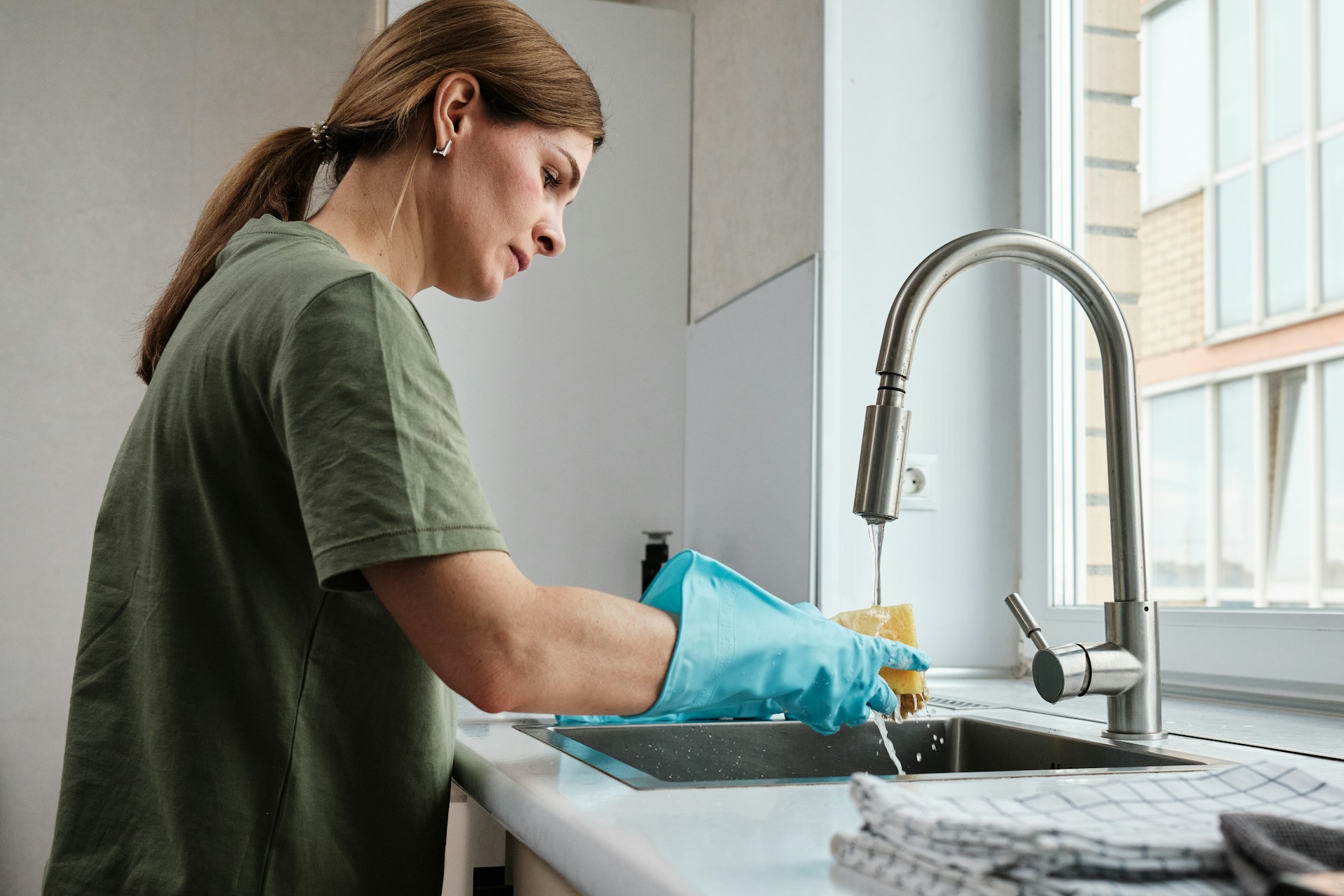A foul odor wafting up from your kitchen sink is more than just an inconvenience. It is often a sign that something is off in your plumbing system. These smells usually begin mildly, growing stronger over time, and making daily kitchen tasks less pleasant. Whether you’re cooking, cleaning, or just passing by, a lingering odor can create an uncomfortable environment quickly.
Ignoring the smell may lead to more serious problems, such as clogs, backups, or pipe damage. These odors typically come from decomposing food, grease, or bacteria trapped within your drain system. Spotting the cause early helps you avoid bigger issues. Below are the most common causes of unpleasant kitchen sink smells and ways to deal with them effectively.
Common Causes Of Foul Odors In Your Kitchen Sink Drain
Many foul kitchen sink odors develop out of view. While some are due to poor habits, others come from gradual buildup that happens over time. These issues are often preventable with awareness and action.
1. Food Residue Build-Up
Each time you rinse a dish, tiny bits of food may slip into the drain. Even with a garbage disposal, not all debris is cleared. Over time, food particles cling to the pipe walls, where they begin to rot. This leads to sour or musty smells that worsen as the weather warms, particularly during hot months like June in Ardmore.
If not addressed, the build-up can harden and create layers of material that resist water flow. This results in a higher chance of a clogged sink and additional space for bacteria and mold to take hold, intensifying the odor.
2. Grease and Oil Build-Up
Pouring grease or oil down the drain in liquid form may seem safe, but as it cools, it turns solid and sticks to pipe interiors. This narrowing effect traps food particles, causing blockages and strong, lingering smells. It also hinders water from flowing smoothly through the pipes.
Unlike soap or water, grease clings to surfaces and accumulates over time. This sticky buildup isn’t always visible, but it’s a major cause of stubborn plumbing odors and clogging issues.
3. Bacterial Growth
Kitchen sink drains offer warm, moist conditions that are ideal for bacterial growth. These bacteria feed on organic materials in your drain and release foul-smelling gases like sulfur compounds, which rise and escape through your drain opening.
A slow-growing biofilm can line the inside of your pipes and contribute to bad smells. In many cases, no noticeable clog is present, but the ongoing odor hints at bacterial colonies expanding out of reach within the plumbing.
Clogged Sink In Ardmore: Local Factors Contributing To Odors
Residents in Ardmore may experience certain additional factors that intensify foul smells in the kitchen during the summer season.
– Water Quality
Ardmore’s water supply contains minerals that can lead to scaling inside pipes. This mineral buildup creates surfaces where food debris and grease can latch on, contributing to ongoing odors. If you notice a white crust near your faucets or around your drain openings, scale residue may already be present in your plumbing system.
This scale not only restricts water flow but also gives bacteria more surfaces on which to spread. In combination with food particles, it creates a long-term issue without proper cleaning and care.
– Older Plumbing Systems
Many homes in Ardmore have aging plumbing systems made from materials that degrade over time. Joints loosen, and once-smooth surfaces become rougher, making it easier for waste to get trapped. These conditions encourage foul odor production and more frequent issues like a clogged sink.
Even if your drains appear to be working normally, older pipes may house hidden buildup. Routine upkeep is key in reducing issues created by outdated materials or configurations in your plumbing network.
Summer events such as family gatherings or backyard barbecues can place extra pressure on your sink. With increased usage, even small problems can become bigger quickly, leading to smells that linger throughout your kitchen.
Effective Solutions For Preventing And Eliminating Odors
You do not always need expensive fixes to address kitchen sink odors, but you do need ongoing care. Here are several options to help prevent these issues and keep your sink smelling fresh.
– Regular Cleaning and Maintenance
Consistency is key. Cleaning your sink drain once or twice a week can go a long way. Try pouring half a cup of baking soda into the drain, followed by a cup of vinegar. Let it sit for 10 minutes. Then, rinse it with hot water to flush away loosened residue.
You can also maintain your garbage disposal by grinding a few ice cubes or small pieces of lemon peel to fight grease buildup and odors. Don’t forget to clean the stopper and drain cover, as they often collect grime.
– Proper Disposal Practices
Be aware of what goes down your sink. Avoid putting grease, oil, dairy products, or fibrous foods into the drain. These materials contribute to clogs and create an environment that traps particles and bacteria.
Tips for proper disposal:
1. Scrape plates fully into the trash before rinsing.
2. Use a sink strainer to catch larger particles.
3. Pour grease into a paper-lined container, let it cool, then dispose of it in the garbage.
4. When using your garbage disposal, run cold water both before and after operation to help waste pass through more effectively.
– Professional Drain Cleaning Services
If odors continue despite your efforts, the problem may be beyond what household products can solve. Buildup deep in the pipes may block partial flow or promote lingering smells that don’t go away.
Our professionals can perform advanced cleaning to reach areas you can’t see or access. With specialized tools and experience, our technicians identify trouble spots, remove residue, and restore proper drain function. This service also helps spot early issues before they become emergencies, keeping your sink efficient and smell-free for longer periods.
Keep Your Ardmore Kitchen Fresh And Odor-Free
Foul smells from your kitchen sink are a warning sign that should not be overlooked. Whether the cause is food residue, trapped grease, bacterial growth, or compromised plumbing, these problems get worse if ignored.
Routine maintenance, good disposal practices, and professional service go a long way in controlling odors. With the right habits, you can avoid a clogged sink in Ardmore and enjoy a cleaner, more pleasant kitchen.
Take control before something small turns into a bigger issue. Making odor prevention part of your cleaning routine means less stress and fewer plumbing surprises. A clean kitchen starts from the drain up, with smart practices and support when you need it most.
If you’re dealing with a clogged sink in Ardmore and want to prevent further plumbing issues, the team at Allied Services is here to help with expert diagnostics and efficient solutions tailored to your home’s needs. For a quick estimate or to book a service visit, please contact us today.


